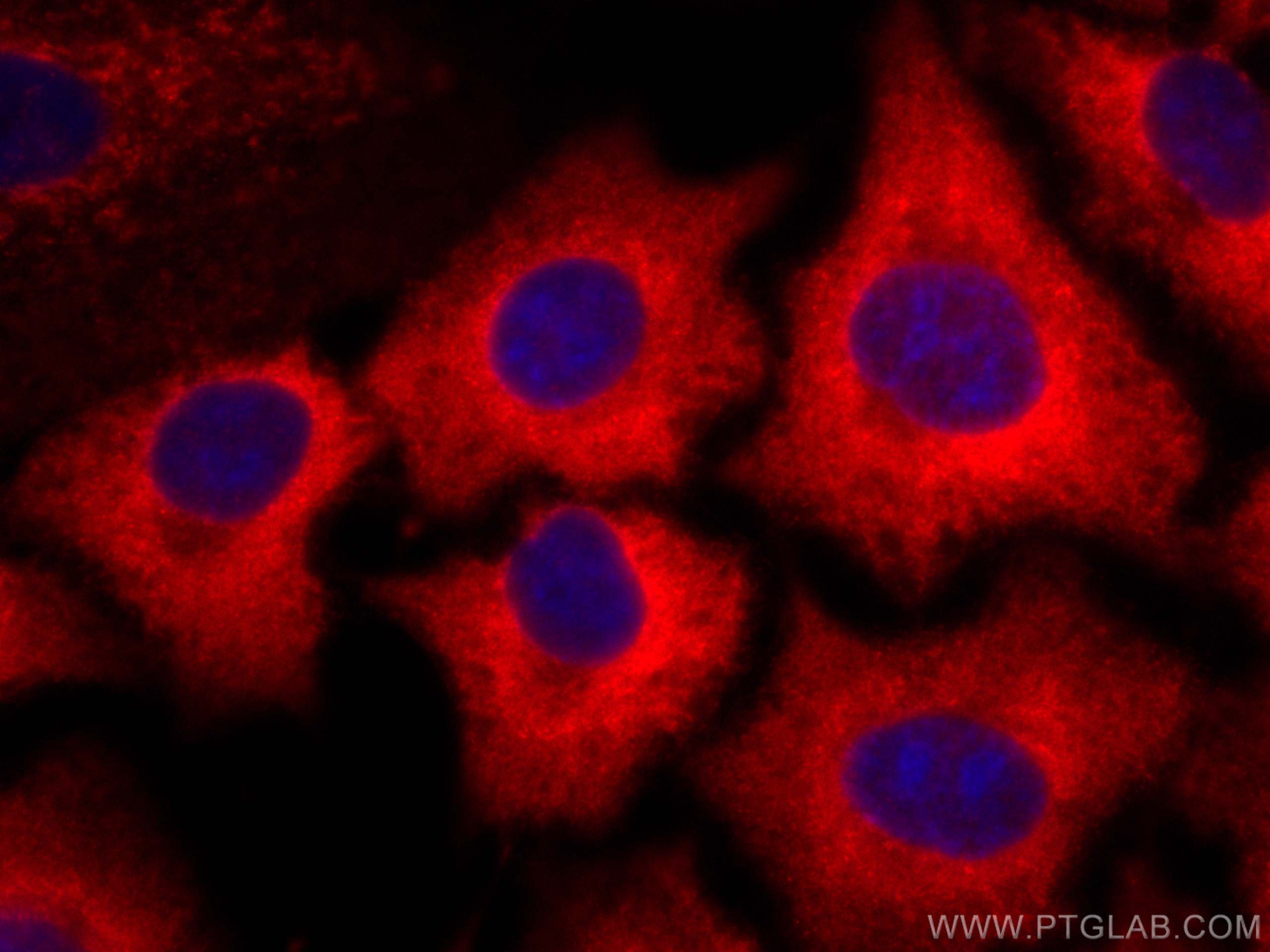Validation Data Gallery
Tested Applications
| Positive IF/ICC detected in | A549 cells |
Recommended dilution
| Application | Dilution |
|---|---|
| Immunofluorescence (IF)/ICC | IF/ICC : 1:50-1:500 |
| It is recommended that this reagent should be titrated in each testing system to obtain optimal results. | |
| Sample-dependent, Check data in validation data gallery. | |
Product Information
CL594-67166 targets ACLY in IF/ICC applications and shows reactivity with Human, Mouse, Rat samples.
| Tested Reactivity | Human, Mouse, Rat |
| Host / Isotype | Mouse / IgM |
| Class | Monoclonal |
| Type | Antibody |
| Immunogen |
CatNo: Ag7709 Product name: Recombinant human ACLY protein Source: e coli.-derived, PGEX-4T Tag: GST Domain: 751-1101 aa of BC006195 Sequence: MFSSEVQFGHAGACANQASETAVAKNQALKEAGVFVPRSFDELGEIIQSVYEDLVANGVIVPAQEVPPPTVPMDYSWARELGLIRKPASFMTSICDERGQELIYAGMPITEVFKEEMGIGGVLGLLWFQKRLPKYSCQFIEMCLMVTADHGPAVSGAHNTIICARAGKDLVSSLTSGLLTIGDRFGGALDAAAKMFSKAFDSGIIPMEFVNKMKKEGKLIMGIGHRVKSINNPDMRVQILKDYVRQHFPATPLLDYALEVEKITTSKKPNLILNVDGLIGVAFVDMLRNCGSFTREEADEYIDIGALNGIFVLGRSMGFIGHYLDQKRLKQGLYRHPWDDISYVLPEHMSM 相同性解析による交差性が予測される生物種 |
| Full Name | ATP citrate lyase |
| Calculated molecular weight | 121 kDa |
| Observed molecular weight | 120 kDa |
| GenBank accession number | BC006195 |
| Gene Symbol | ACLY |
| Gene ID (NCBI) | 47 |
| RRID | AB_2934759 |
| Conjugate | CoraLite®594 Fluorescent Dye |
| Excitation/Emission maxima wavelengths | 588 nm / 604 nm |
| Form | |
| Form | Liquid |
| Purification Method | Caprylic acid/ammonium sulfate precipitation |
| UNIPROT ID | P53396 |
| Storage Buffer | PBS with 50% glycerol, 0.05% Proclin300, 0.5% BSA{{ptg:BufferTemp}}7.3 |
| Storage Conditions | Store at -20°C. Avoid exposure to light. Stable for one year after shipment. Aliquoting is unnecessary for -20oC storage. |
Background Information
ACLY(ATP-citrate synthase) is also named as ACL. It is the primary enzyme responsible for the synthesis of cytosolic acetyl-CoA. ACLY serves as not only a target in oxygenated cells for suppression of lipid synthesis and histone acetylation, but also as a susceptible target in hypoxic cells to restore inhibition of glycolysis. In nonsmall cell lung carcinoma and hepatocellular carcinoma, ACLY is overexpressed compared with normal parenchyma suggesting that ACLY may represent a common target among highly malignant tumors(PMID:19795461). This protein has 2 isoforms produced by alternative splicing.
Protocols
| Product Specific Protocols | |
|---|---|
| IF protocol for CL594 ACLY antibody CL594-67166 | Download protocol |
| Standard Protocols | |
|---|---|
| Click here to view our Standard Protocols |

